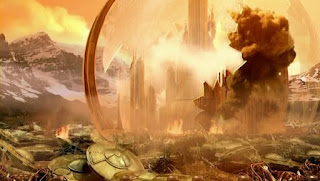 Lisa Cholodenko isn’t a household name as writer/directors go, but that may change somewhat after her latest film, The Kids Are All Right, which was released smack in the middle of the summer, and recently came out on DVD and Blu-ray. The movie features three of our greatest actors – Annette Bening, Julianne Moore, and Mark Ruffalo – doing some of the most astute work of their careers. Expect the movie to snag some Oscar nominations for one or more of the trio, and if there’s any justice, Cholodenko and co-writer Stuart Blumberg will be nominated for Best Original Screenplay as well.
Lisa Cholodenko isn’t a household name as writer/directors go, but that may change somewhat after her latest film, The Kids Are All Right, which was released smack in the middle of the summer, and recently came out on DVD and Blu-ray. The movie features three of our greatest actors – Annette Bening, Julianne Moore, and Mark Ruffalo – doing some of the most astute work of their careers. Expect the movie to snag some Oscar nominations for one or more of the trio, and if there’s any justice, Cholodenko and co-writer Stuart Blumberg will be nominated for Best Original Screenplay as well.The movie is blisteringly funny while at the same time painfully honest. It tells the story of a lesbian couple (Bening and Moore) who’ve been together for 20 years and raised two children (played Mia Wasikowska and Josh Hutcherson) who are now at an age when they’re interested in meeting their sperm donor (Ruffalo). Human comedy ensues with unexpected results. The Kids Are All Right is one of the best movies of the year, and Cholodenko, whose previous films include High Art and Laurel Canyon, is a huge factor in its success. Now you might be thinking that a movie about two lesbians and their kids isn’t exactly what you’re looking for. If so, you’re exactly the person who should see this film, because it’ll change your ideas of what makes a family in this day and age. And it will make you laugh – loud and hard.
Cholodenko took some time out to talk to Bullz-Eye on the occasion of the film’s home video release and after some introductory chit-chat we discussed the lesbian right, gay porn, and new meanings for the word “tribe.”
Bullz-Eye: The Kids are All Right was like this oasis of reason in an ocean of CGI and fart jokes this past summer. Do you get frustrated when you look around see the types of movies that rake in the big bucks these days?
Lisa Cholodenko: I wish we would kind of go back to the time where there were more interesting, idiosyncratic human kinds of comedies and dramas, and not such the kind of broad and farcical, box office driven fare, but that’s where we are right now, so, I just accept it, and I’m glad that there’s space for films like this.
BE: Well, so am I. There was some fairly vocal criticism of the film from the most unlikely of places – the lesbian community. Where do you think that kind of outrage comes from and, outside of raising awareness for the film itself, does that kind of anger serve any worthwhile purpose for a thoughtful movie like this?
LC: I keep referring to them as the lesbian right (chuckling), and I think that in any kind of group there’s going to be a contingent of people that are more extreme in their views of things, and more politicized and so, I think there’s room for everybody, and I don’t have a problem with that. It’s gets a little tedious speaking to it – not to you – but when I’ve heard it in Q & A’s and stuff, but I’m sympathetic. There’ve obviously been no great representations of lesbians in cinema, or certainly there hasn’t been in a long time, and it’s kind of an old school doctrinaire, “Oh of course the lesbian goes off with a man.” But if you look at the film with any kind of care, it’s really not about that at all.
Read the rest of this interview with Lisa Cholodenko by clicking here and visiting Premium Hollywood.






















